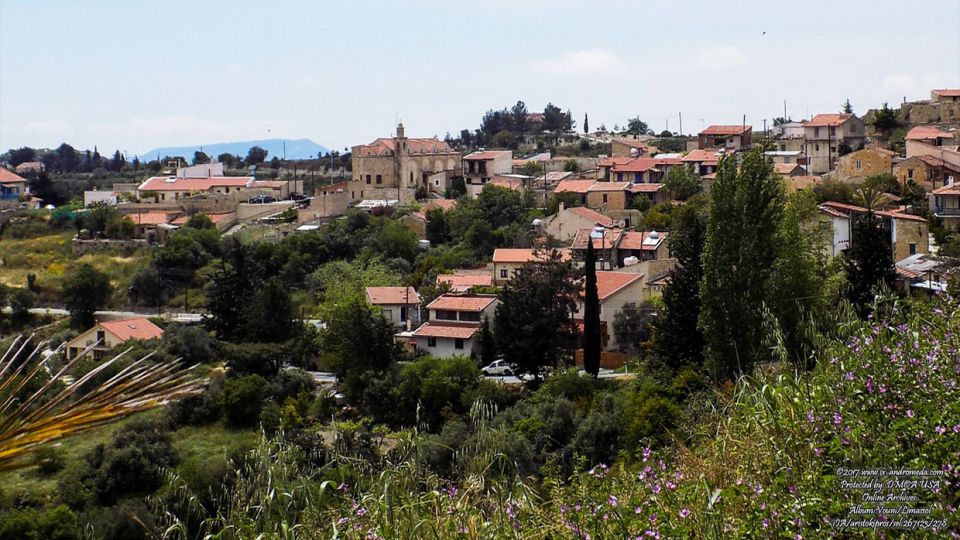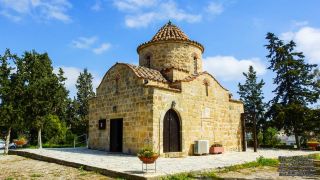The village of Vouni in Limassol district is a “living” time museum for those who wish to study the history of Cyprus from the Middle ages until today.
It is found built on a south slope of the mountains of Troodos, west of the river Kryos. The houses of the village are “gathered” on the slope of the small mountain (from which it got its name), and they are all old mansions with two levels and a central entrance leading to a courtyard with rooms surrounding it, and high surrounding walls. The houses’ architecture reveals the nobility of their owners to the visitors.
Upon walking along the streets of the village, we ended up in the square where the offices of the village’s authorities and a traditional Cypriot Kafeneio (coffee shop) are found. We talked to people who told us the story of their village.
“Until a few years ago, the area from the peak of the Afamis mountain, until Souni and Zanatzia, along with the areas which include Ha-potami from west and Kryos potamos from east, were all vineyards. This concerns hundreds of thousands of “skala” (metric unit for areas of land, 1 skala = 1,337.80 m2 ) of vines. More than a thousand of permanent residents used to live in Vouni and they increased to become a few thousands due to the “foreign” workers that arrived to harvest crops, olives, carobs and at the end of August they started with vine harvesting.
The workers coming from the villages of Paphos arrived by hundreds and they gathered in the square of the village and from there they were accommodated in the houses where they would work for the next 6-7 months.
The Elementary school is built on the highest location of the village, it had eight classes with 200 pupils.”
The faucets existing in each neighbourhood of the village are leftovers and “souvenirs” of the English presence as an occupational power on the island. East of the village, under the shade of a huge platanus tree, there is an old faucet which was transformed into a water collecting basin with seven taps, from which the settlers provided themselves with the necessary for their needs water. Today the water of the Venetian basin is not potable. The village is provided with water from very far away. From the area of Mesa potamos, or as it is also called “Arkolachania”.
The main church is dedicated to Agios Ioannis Prodromos. It is believed that in the same location where Vouni is found, there were 3 small settlements. When the big leprosy outbreak took place in Cyprus in 1692, the only settlers that were saved from it were those in Vouni, due to a miracle of Agios Ioannis. There are another five churches on the village’s limits.
What does a village such as Vouni has to offer its visitor, since most of its houses are halfway collapsed and abandoned?
The truth is that Vouni has a lot to offer even in its today’s state. Many of its houses may be abandoned and ruined, the village may be only inhabited by 130 people, the thousands of hectares of vineyards may not exist anymore. The Elementary school may not host any teacher and in its classes it may not have any pupils. The old mansions with the arches of their halls may remain “silent” The Venetian basin with its taps may not “receive” the village girls that go to fill their jars. All of this is true. However, there is another truth too.
The truth that touches the visitor’s feelings,when he walks along the narrow, paved streets of the village, filled with flowers.
When you walk among the old and empty mansions, you will “feel” the arms of some invisible gardener taking care of the thousands, colourful rose bushes that you will see during your walk. There are rose bushes everywhere. In each hall, in each yard, in all the streets. And it is not just the rose bushes that colour the roads you will pass from. The “skilaki” plant (literally doggy plant, or Antirrhinum majus) is seen everywhere. In all the houses, all the streets, all the walls.
A winery, a park, a school that during the Ottoman Empire was a “Krifo scholeio” (secret school), quite a few traditional Kafeneio (coffee shops) and many other things will occupy you for many hours.
The people who live there either permanently either temporarily are characterised by one thing: their cleanliness. We walked along the streets of the village for hours, and we did not see a single piece of paper on the ground. Everything is clean and tidy, another proof of the nobility of its people.
Vouni in Limassol, the village with 130 residents, at celebrations and weekends is transformed. The houses open and receive their migrant settlers. The chimneys give out smoke and people of all ages come and go along the streets. Parking lots are filled with vehicles, whose owners flood taverns and coffee shops.
This is Vouni today.




